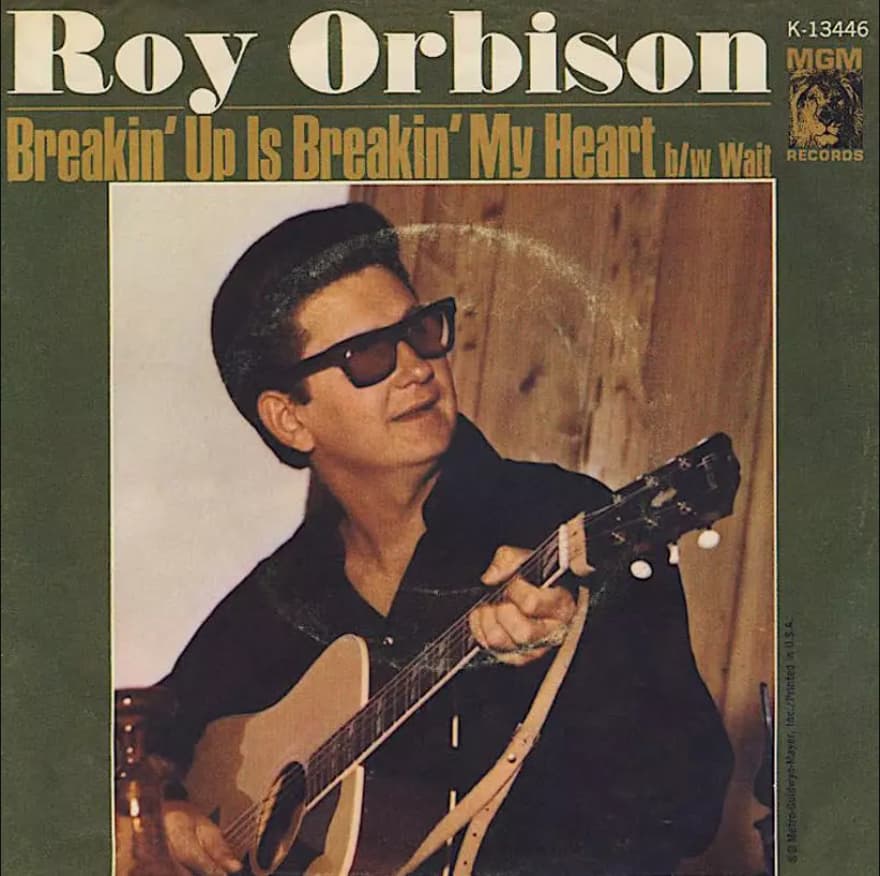
When the Tempo Speeds Up, But the Heart Still Slows Down
The year was 1966, a time of shifting sands in popular music, yet some voices remained timeless, echoing the perennial ache of the human condition. Among them, the great Roy Orbison stood, a master of heartbreak, and on January 22, 1966, he delivered another poignant testament to romantic loss with the single “Breakin’ Up Is Breakin’ My Heart.”
This particular tune is a fascinating entry in the catalogue of “The Big O,” as it finds him in the early years of his tenure with MGM Records, having moved on from his monumental run with Monument. It was released as a single to promote his second album for the label, “The Orbison Way,” which hit shelves later in January 1966. What makes this track noteworthy is its tempo. While Orbison is eternally synonymous with the sweeping, dramatic, and often slow-burning ballads like “Crying” and “In Dreams,” “Breakin’ Up Is Breakin’ My Heart” is an uptempo number, a faster-paced slice of rock and roll heartache. It’s an infectious beat, certainly, loaded with what Billboard magazine at the time described as “dance appeal,” yet it’s impossible to mistake the desolate emotion at its core, a perfect example of his ability to inject vulnerability even into a song built for dancing.
Chart-wise, the single performed respectfully in a crowded field of musical giants. It peaked at No. 31 on the Billboard Hot 100 in the United States. As was often the case for his records, it fared a little better across the pond, reaching No. 22 on the UK Singles Chart. The accompanying album, “The Orbison Way,” achieved a modest peak of No. 128 on the Billboard Top LPs chart, and a more respectable No. 11 on the UK Albums Chart. These positions, while not reaching the stratospheric heights of his early-60s blockbusters, confirmed his enduring presence on the global music scene.
The story behind the song, like many of Orbison’s later hits, is rooted in his highly fruitful songwriting partnership with Bill Dees. This collaboration yielded some of his most enduring work, perhaps most famously, “Oh, Pretty Woman.” “Breakin’ Up Is Breakin’ My Heart” captures a simple, universal truth: the physical act of separation—breaking up—is literally and agonizingly tearing apart the heart of the person left behind. The lyrics convey a man whose world is crashing down even as he puts on a brave, rhythmic front. Lines like “the love affair we used to share is cold and still / And still I love you then I love you now I always will,” reveal the deep chasm between the song’s upbeat rhythm and its profoundly sad message. It’s the sound of a man who can’t stop loving, even when he’s been utterly rejected, his voice soaring with that distinct, powerful vibrato over the bustling instrumentation.
For those of us who recall listening to Roy Orbison on an AM radio dial, this song conjures the bittersweet memory of a dance floor moment—a fast song that somehow felt slow, because you were moving but your mind was stuck on what you’d lost. The arrangement is full and rich, complete with orchestration and a chorus, a typical hallmark of his MGM sound. It shows an artist who, despite personal tragedies looming on his horizon, still worked relentlessly, channeling his life’s intense emotion into every note. It is a hidden gem for its clever contrast, proving that sometimes, the hardest tears are the ones shed while trying to tap your foot.